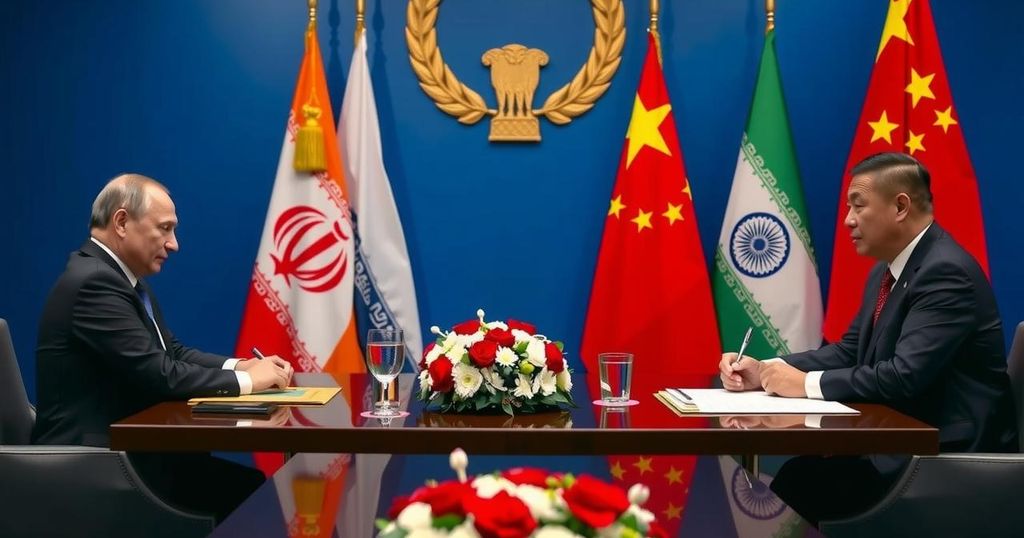BRICS Summit: Putin and Allies Push for a New World Order to Challenge Western Dominance
President Vladimir Putin convened the BRICS Summit in Kazan, Russia, where over two dozen countries discussed establishing a ‘new world order’ to reduce dependence on the U.S. dollar and challenge Western hegemony. The summit highlighted the growing cooperation between China and India and saw discussions on creating alternative financial systems amid the backdrop of increased sanctions from the West. The BRICS alliance is poised for expansion and seeks to reform global financial institutions to better serve developing nations.
This week, President Vladimir Putin of Russia gathered representatives from over two dozen countries at the BRICS Summit in Kazan, Russia, aiming to establish a “new world order” that is less dependent on Western dominance, particularly that of the United States dollar. The summit, occurring from Tuesday to Thursday, provides Putin with a prominent global stage following the onset of the Ukraine conflict in 2022. The BRICS alliance, which comprises Brazil, Russia, India, China, and South Africa, intends to reduce reliance on the U.S. dollar in an effort to circumvent sanctions imposed by Western nations. Putin articulated his concerns at the summit, stating, “The dollar is being used as a weapon. We really see that this is so. I think that this is a big mistake by those who do this.” In a notable development, Chinese President Xi Jinping and Indian Prime Minister Narendra Modi utilized this summit as an opportunity to advance their relationship, particularly following a recent agreement aimed at resolving their prolonged military standoff over a contested Himalayan region. Putin remarked, “Russia-China cooperation in international affairs is one of the main stabilizing factors in the world,” during discussions with Xi. India has also been bolstering Russia’s economy by purchasing discounted oil that many global players have chosen to avoid due to sanctions. The BRICS group is expanding its membership, having recently welcomed countries including Iran, Egypt, Ethiopia, the United Arab Emirates, and Saudi Arabia, with additional interest expressed from Turkey, Azerbaijan, Malaysia, and Pakistan. Currently, the alliance represents approximately half of the world’s population and 35% of the global economic output. Russian officials perceive the summit as a considerable triumph; Yuri Ushakov, an aide to Putin for foreign policy, noted that 36 countries confirmed participation, with 24 sending representatives. Furthermore, Russia is actively seeking to establish a payment system to serve as an alternative to the SWIFT system, which has been employed to initiate sanctions on Russian officials by Western nations. However, while Russia champions a confrontational agenda at the summit, several members, including Brazil, India, and South Africa, are advocating for a more moderate approach, suggesting that the alliance should be utilized to reform international institutions, such as the World Bank and the International Monetary Fund, to better serve the developing countries. Iranian President Masoud Pezeshkian urged the BRICS coalition to transcend being merely a “dialogue club,” stressing that many of its objectives remain unfulfilled after 15 years of existence. He criticized Western powers for their imposition of sanctions, stating, “This monopolistic outlook has resulted in increased violence, war, and terrorism on the one hand, and unprecedented use of economic and political sanctions on the other.” Currently, dollar-denominated assets constitute approximately 59% of global foreign currency reserves, a notable decrease from 70% in 1999.
The BRICS Summit is a crucial event bringing together key emerging economies that aim to create an alternative to Western-dominated political and economic structures. As different nations grapple with the increasing influence of the dollar in international trade, the alliance is exploring new avenues for financial cooperation. The group’s expansion to include more countries signifies their collective ambition to reshape global economic dynamics and reduce dependency on Western currencies and institutions.
In summary, the BRICS Summit represents a pivotal moment for member nations to discuss strategies aimed at decreasing reliance on Western financial systems, particularly the U.S. dollar. With significant representation from key countries like China and India, the summit reflects a shift towards a new global order, potentially altering the balance of economic power. However, the divergence in agendas among member states may present challenges in realizing a cohesive strategy going forward.
Original Source: www.foxnews.com




Post Comment